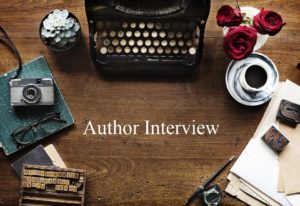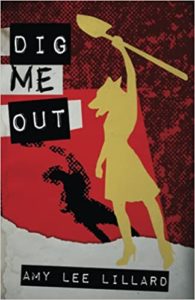An Interview with Amy Lee Lillard
 Amy Lee Lillard has been writing for a long time, for herself and for other people. She’s worked as a marketer and copywriter for over twenty years, but she’s also placed her own work—both fiction and nonfiction—in Atlas and Alice, Barrelhouse, Epiphany, LitHub, Off Assignment, Entropy, Electric Lit, and more. In addition, she was “shortlisted for the 2017 Berlin Writing Prize and named one of Epiphany’s Breakout 8 Writers in 2018.” Here we are in 2021, and her first collection of short fiction, Dig Me Out, has arrived! One Goodreads reviewer wrote of the book, “These multi-layered stories are riveting and propulsive. The characters and stories have staying power”—words Amy is sure to love. Amy’s career, her writing, and her role as a podcaster keep her busy, so I’m thankful she had the time to answer a few questions.
Amy Lee Lillard has been writing for a long time, for herself and for other people. She’s worked as a marketer and copywriter for over twenty years, but she’s also placed her own work—both fiction and nonfiction—in Atlas and Alice, Barrelhouse, Epiphany, LitHub, Off Assignment, Entropy, Electric Lit, and more. In addition, she was “shortlisted for the 2017 Berlin Writing Prize and named one of Epiphany’s Breakout 8 Writers in 2018.” Here we are in 2021, and her first collection of short fiction, Dig Me Out, has arrived! One Goodreads reviewer wrote of the book, “These multi-layered stories are riveting and propulsive. The characters and stories have staying power”—words Amy is sure to love. Amy’s career, her writing, and her role as a podcaster keep her busy, so I’m thankful she had the time to answer a few questions.
Christina: Congrats on your book! Dig Me Out is a collection of short fiction. Are you drawn to the shorter form? Does short-story writing have an advantage over longer works?
Amy: Powerful short stories tell something complete in a small space. I was inspired by short story writers like Carmen Maria Machado, Chanelle Benz, Nana Kwame Adjei-Brenyah, and Ray Bradbury – their works all paint these rich, gutting, beautiful stories in a handful of pages. It’s a fun challenge as a writer.
Christina: The description for the book reads: “Spanning genres, continents, and eras, Dig Me Out takes on misogyny and homophobia, societal and climatological violence, and the specter of our technologized future.” What was your intent when you set to writing this book? Did those themes arise organically?
Amy: As I wrote these stories, I found myself returning again and again to angry women. We’re socialized to hide our anger, to downplay it, to internalize it. And if we do show our anger, we’re called hysterical, or nags, or ugly, or cute. We’re too much. So I explored women who were angry and showed it, I found the stories taking me all over the place – past, present, and future.
Christina: In an email, you wrote “I’m bringing a (seasoned?) perspective on anger, queer identity, and more.” Can you tell us a little bit more about that perspective?
Amy: I’m an older debut author—this is my first published book and I’m forty-four. We prize youth so much in our culture, and even in the book world. But the things I wrote when I was younger were decidedly bad. It took me many years, and many, many rejections, to find my voice. I had to live more, have more experiences, discover all the parts of myself before I could really write the way I wanted to.
As women age, there’s a point at which we fade out of cultural relevance. Sometime in the mid thirties, or around forty, people didn’t really care about women anymore. There’s freedom in that. I used that freedom to really embrace my anger at the world and channel it into my writing.
Christina: You were diagnosed with autism relatively late. What was that process like? Did you anticipate the diagnosis at all? How does autism inform your life, your writing? Do you have any tips for helping people to be more accepting of neurodiversity?
Amy: Last year, I read an article by a woman in her thirties who had just discovered she was autistic. The things she described, particularly her lifelong difficulties with friendships and social relationships, really struck a chord. So I started reading everything I could, and found a whole community of women diagnosed later in life, overlooked by the times we grew up in and ignored by medical biases that view autism as something for young white boys. I talked to a therapist and underwent some testing and found I matched nearly every aspect of autism.
It was shocking, but also not. I knew, just knew, all my life that I was different, but, as a young person socialized as a girl, I had learned to hide it very well. Understanding the whys behind the struggles has unlocked so much and helped me understand why I do the things I do.
Neurodiversity, and particularly autism, is not a disorder or a disability in my mind. It’s simply difference and can bring highly unique ideas and approaches to all aspects of life.
Christina: Carter Sickels called you a “daring” writer. How would you respond to the use of that term? Do you agree with it? If not daring, what sort of writer would you call yourself?
Amy: That was a dream to hear. Because that’s what I want to be! I want to push the boundaries of story and style to create something unique and hard-hitting. So to see that it’s working for some readers, especially someone I respect as deeply as Carter, is beyond exciting.
Christina: You comprise one half of the podcast duo Broads and Books, which is such fun (and enlightening) to listen to. How do you choose the themes for your episodes?
Amy: For some time now we’ve been choosing themes based on songs. So recently my co-creator Erin chose the song “Somebody That I Used to Know,” and we selected book and pop culture picks around the idea of drastic change. I recently picked “Holding Out For a Hero,” and we talked about books concerning heroics. It’s a fun way of choosing new themes and angles for our recommendations.
Christina: Do you have a most memorable episode? What makes it so memorable? Do you have a wish list of topics or people you’d love to discuss?
Amy: Every episode becomes memorable because we end up talking about things we hadn’t planned. There’s a lot of improvisation and running with weird stories and ideas. It often results in tangents and asides that can make us cry with laughter. Erin and I have similar strange senses of humor, so the results are highly memorable.
Christina: What does literary success mean to you?
Amy: From a practical standpoint, it means the ability to continue writing and publishing books! To find homes for all the stories I want to tell. And from a personal standpoint, it means reaching, connecting, and making an impression on readers. If I hear from a reader that a story is speaking to them, that’s success.
Amy can be found in multiple places!
Website: https://www.amyleelillard.com/
Facebook: @amylillard
Instagram: @amyleelillard
Twitter: @amyleelillard
Thanks to Amy for agreeing to this interview! If you know of an author who’d like to be featured in an interview (or you are an author who would like to be featured), feel free to leave a comment or email me via my contact page.

